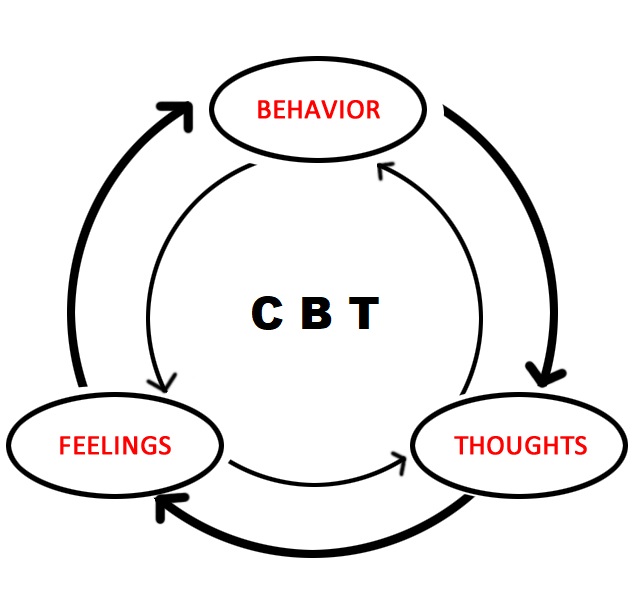Many people suffer from mental health conditions like insomnia, anxiety and depression. Even though these are separate psychological ailments, a possible treatment starting point is cognitive behavioral therapy or CBT.
CBT – a Tool for Mental Health Challenges:
Cognitive behavioral therapy (CBT) is commonly used in counseling and psychotherapy. As a form of therapy, it is fairly popular due to the fact that research shows high success rates. CBT has individuals work with a mental health professional in a structured manner that allows patients to reflect on their actions, emotions and thinking patterns.
As patients learn to guide and reflect on their emotional reactions, these reflections provide people an opportunity to become aware of inaccurate and negative thoughts. Individuals learn how to engage in new thought processes that allow them to analyze challenging situations more clearly.
In this way, they can respond to these situations in a more productive way. CBT allows people to change their thought patterns, emotional responses and behavior. By changing this, people are more likely to become unstuck and overcome life’s obstacles.
Many people would like to learn how to better manage stressful life situations. Cognitive behavioral therapy provides the tools to accomplish this task. By working closely with a mental health professional in a structured way, CBT helps people discover inaccurate or negative thinking that only make situations worse.
Cognitive behavioral therapy is used to treat a wide range of issues. Which means that not everyone who benefits from CBT has a diagnosed mental health condition like PTSD or Anorexia Nervosa. As a type of psychotherapy, CBT is beneficial because it can quickly help to identify and specific emotional challenges. With these identified, a skilled psychiatrist or therapist can help to generate coping strategies.
Well-structured cognitive behavioral therapy may make people feel emotionally uncomfortable as they explore painful feelings, emotions and experiences. But, this is part of the therapy as patients, with the help of a therapist, intervene and examines their thoughts and emotions. CBT is a flexible treatment option that combines a number of basic principles from behavioral and cognitive psychology.
It is a problem-solving form of therapy that seeks to treat the specific problems related to a diagnosed mental disorder. Mental health practitioners help their patients locate and learn effective strategies that will decrease symptoms of the disorder. Through a process known as cognitive restructuring, patients learn to identify and dispute irrational or maladaptive thoughts known as cognitive distortions. CBT is based on the belief that these thought distortions and maladaptive behaviors play a role in the development and maintenance of psychological disorders.
An Effective Form of Psychological Therapy:
According to the American Psychological Association (APA), CBT is an effective form of psychological therapy. Increasingly, research demonstrates that this treatment approach is effective for managing conditions such as anxiety disorders, bulimia, insomnia and personality disorders. CBT is also popular among many behavioral health providers due to the fact that there are little side effects.
At its core, cognitive behavioral therapy is about changing how people think about themselves and the world around them. When patients incorporate strategies into their daily life, they can gain valuable insight into their personal emotional and thought process.
Exactly how CBT is delivered varies from patient to patient. The therapy is based on people’s needs, as well as other existing problems they may have in their life. But, this type of therapy has a common principle. People’s thoughts, feelings and behaviors all affect each other. These effects create an endless feedback loop. This is a key theory behind CBT.
When individuals control their thinking, they learn how to control or reframe their behaviors and emotions. People need to change unhelpful or problematic ways of thinking in order to successfully change unwanted or unhealthy behaviors. Well-administrated CBT helps patients identify issues, reframe their thinking, develop coping mechanisms, face the emotional trigger and practice.
It is important to note that for some people, cognitive behavioral therapy by itself can help individuals manage mood disorders, anxiety disorders, addictions, insomnia, schizophrenia or PTSD. However, in some cases, these conditions are best treated with a combination of CBT and medication, or CBT and another therapy.
About Emerald Psychiatry & TMS Center:
For more information about cognitive behavioral therapy, contact Emerald Psychiatry & TMS Center. Their psychiatry practice is focused on providing experienced and professional treatment options. They understand that they are here to serve the needs and concerns of their patients. By forming a trusting partnership with their patients, Emerald Psychiatry generates a comprehensive treatment plan that is customized to an individual’s needs.
Follow on Twitter:
#EmeraldPsychiatry #ColumbusTMS #DublinTMS #WestervilleTMS


Recent Comments